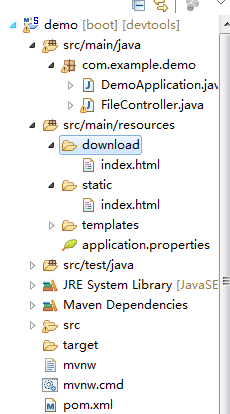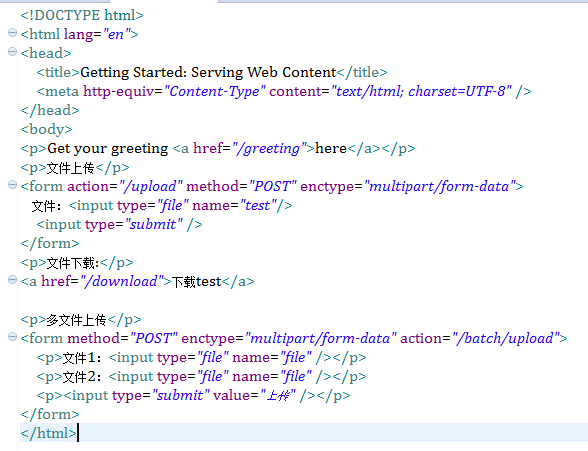【转载】http://blog.csdn.net/coding13/article/details/54577076
一下代码为自己改进的代码
1、工程结构图

2、pom.xml文件依赖项
<groupId>com.example</groupId>
<artifactId>demo</artifactId>
<version>0.0.1-SNAPSHOT</version>
<packaging>jar</packaging>
<name>demo</name>
<description>Demo project for Spring Boot</description>
<parent>
<groupId>org.springframework.boot</groupId>
<artifactId>spring-boot-starter-parent</artifactId>
<version>1.5.9.RELEASE</version>
<relativePath/> <!-- lookup parent from repository -->
</parent>
<properties>
<project.build.sourceEncoding>UTF-8</project.build.sourceEncoding>
<project.reporting.outputEncoding>UTF-8</project.reporting.outputEncoding>
<java.version>1.8</java.version>
</properties>
<dependencies>
<dependency>
<groupId>org.springframework.boot</groupId>
<artifactId>spring-boot-starter-web</artifactId>
</dependency>
<dependency>
<groupId>org.springframework.boot</groupId>
<artifactId>spring-boot-starter-test</artifactId>
<scope>test</scope>
</dependency>
<dependency>
<groupId>org.springframework.boot</groupId>
<artifactId>spring-boot-starter-thymeleaf</artifactId>
</dependency>
<dependency>
<groupId>org.springframework.boot</groupId>
<artifactId>spring-boot-devtools</artifactId>
<optional>true</optional>
</dependency>
</dependencies>
<build>
<plugins>
<plugin>
<groupId>org.springframework.boot</groupId>
<artifactId>spring-boot-maven-plugin</artifactId>
</plugin>
</plugins>
</build>
3、Application.java
import org.springframework.boot.SpringApplication;
import org.springframework.boot.autoconfigure.SpringBootApplication;
@SpringBootApplication
public class Application {
public static void main(String[] args) {
SpringApplication.run(Application.class, args);
}
}
4、FileController.java
package com.example.demo;
import org.springframework.http.ResponseEntity;
import org.springframework.stereotype.Controller;
import org.springframework.ui.Model;
import org.springframework.web.bind.annotation.RequestMapping;
import org.springframework.web.bind.annotation.RequestMethod;
import org.springframework.web.bind.annotation.RequestParam;
import org.slf4j.Logger;
import org.slf4j.LoggerFactory;
import org.springframework.web.bind.annotation.ResponseBody;
import org.springframework.web.multipart.MultipartFile;
import org.springframework.web.multipart.MultipartHttpServletRequest;
import ch.qos.logback.core.net.SyslogConstants;
import javax.servlet.http.HttpServletRequest;
import javax.servlet.http.HttpServletResponse;
import java.io.*;
import java.util.List;
@Controller
public class FileController {
@RequestMapping("/greeting")
public String greeting(@RequestParam(value="name", required=false, defaultValue="feng") String name, Model model) {
model.addAttribute("name", name);
return "greeting";
}
private static final Logger logger = LoggerFactory.getLogger(FileController.class);
//文件上传相关代码
@RequestMapping(value = "upload")
@ResponseBody
public String upload(@RequestParam("test") MultipartFile file) {
if (file.isEmpty()) {
return "文件为空";
}
// 获取文件名
String fileName = file.getOriginalFilename();
logger.info("上传的文件名为:" + fileName);
// 获取文件的后缀名
String suffixName = fileName.substring(fileName.lastIndexOf("."));
logger.info("上传的后缀名为:" + suffixName);
// 文件上传后的路径
String filePath = "E://test//";//服务器路径
// 解决中文问题,liunx下中文路径,图片显示问题
// fileName = UUID.randomUUID() + suffixName;
File dest = new File(filePath + fileName);
// 检测是否存在目录
if (!dest.getParentFile().exists()) {
dest.getParentFile().mkdirs();
}
try {
file.transferTo(dest);
return "上传成功";
} catch (IllegalStateException e) {
e.printStackTrace();
} catch (IOException e) {
e.printStackTrace();
}
return "上传失败";
}
//文件下载相关代码
@RequestMapping("/download")
@ResponseBody
public String downloadFile(HttpServletRequest request, HttpServletResponse response){
String fileName = "index.html";
// String fileName = request.getParameter("name");
if (fileName != null) {
//当前是从该工程的WEB-INF//File//下获取文件(该目录可以在下面一行代码配置)然后下载到C:usersdownloads即本机的默认下载的目录
// String realPath = request.getServletContext().getRealPath( "download");
//绝对路径可行,不知道上一行的相对路径怎么设置。
String realPath = "D:SpringToolWorkspacedemosrcmain
esourcesdownload";
File file = new File(realPath, fileName);
if (file.exists()) {
response.setContentType("application/force-download");// 设置强制下载不打开
response.addHeader("Content-Disposition",
"attachment;fileName=" + fileName);// 设置文件名
byte[] buffer = new byte[1024];
FileInputStream fis = null;
BufferedInputStream bis = null;
try {
fis = new FileInputStream(file);
bis = new BufferedInputStream(fis);
// OutputStream os = response.getOutputStream();
String pathname = "e://download//filetest//"; //下载到自己设置的对应路径,默认是浏览器下载的路径
File FilePath = new File(pathname);
FilePath.mkdirs();
File file2 = new File(FilePath,"file7.txt");
file2.createNewFile();
OutputStream os = new FileOutputStream(file2);
int i = bis.read(buffer);
while (i != -1) {
os.write(buffer, 0, i);
i = bis.read(buffer);
}
System.out.println("success");
} catch (Exception e) {
e.printStackTrace();
} finally {
if (bis != null) {
try {
bis.close();
} catch (IOException e) {
e.printStackTrace();
}
}
if (fis != null) {
try {
fis.close();
} catch (IOException e) {
e.printStackTrace();
}
}
}
return "下载成功";
}
}
return "文件不存在";
}
/* //文件下载相关代码
@RequestMapping("/download")
public ResponseEntity<Byte[]> download(@RequestParam("name") String name) throws IOException{
String path =
return null;
}*/
//多文件上传
@RequestMapping(value = "/batch/upload", method = RequestMethod.POST)
@ResponseBody
public String handleFileUpload(HttpServletRequest request) {
List<MultipartFile> files = ((MultipartHttpServletRequest) request)
.getFiles("file");
MultipartFile file = null;
BufferedOutputStream stream = null;
for (int i = 0; i < files.size(); ++i) {
file = files.get(i);
if (!file.isEmpty()) {
try {
byte[] bytes = file.getBytes();
File filePath2 = new File("e:"+File.separator+"test"); //上传到指定目录,若不指定默认上传到工程的根目录
filePath2.mkdirs();
File fileoutPutStream= new File(filePath2,file.getOriginalFilename());
stream = new BufferedOutputStream(new FileOutputStream(
fileoutPutStream));
stream.write(bytes);
stream.close();
} catch (Exception e) {
stream = null;
return "You failed to upload " + i + " => "
+ e.getMessage();
}
} else {
return "You failed to upload " + i
+ " because the file was empty.";
}
}
return "upload successful";
}
}
5、index.html

Get your greeting here
下载test多文件上传